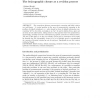Free Online Productivity Tools
i2Speak
i2Symbol
i2OCR
iTex2Img
iWeb2Print
iWeb2Shot
i2Type
iPdf2Split
iPdf2Merge
i2Bopomofo
i2Arabic
i2Style
i2Image
i2PDF
iLatex2Rtf
Sci2ools
105
Voted
CORR
2000
Springer
2000
Springer
The lexicographic closure as a revision process
The connections between nonmonotonic reasoning and belief revision are well-known. A central problem in the area of nonmonotonic reasoning is the problem of default entailment, i.e., when should an item of default information representing "if is true then, normally, is true" be said to follow from a given set of items of such information. Many answers to this question have been proposed but, surprisingly, virtually none have attempted any explicit connection to belief revision. The aim of this paper is to give an example of how such a connection can be made by showing how the lexicographic closure of a set of defaults may be conceptualised as a process of iterated revision by sets of sentences. Specifically we use the revision method of Nayak.
| Added | 17 Dec 2010 |
| Updated | 17 Dec 2010 |
| Type | Journal |
| Year | 2000 |
| Where | CORR |
| Authors | Richard Booth |
Comments (0)

